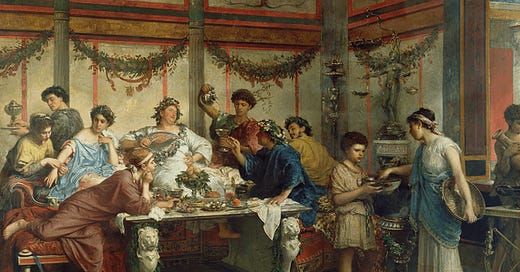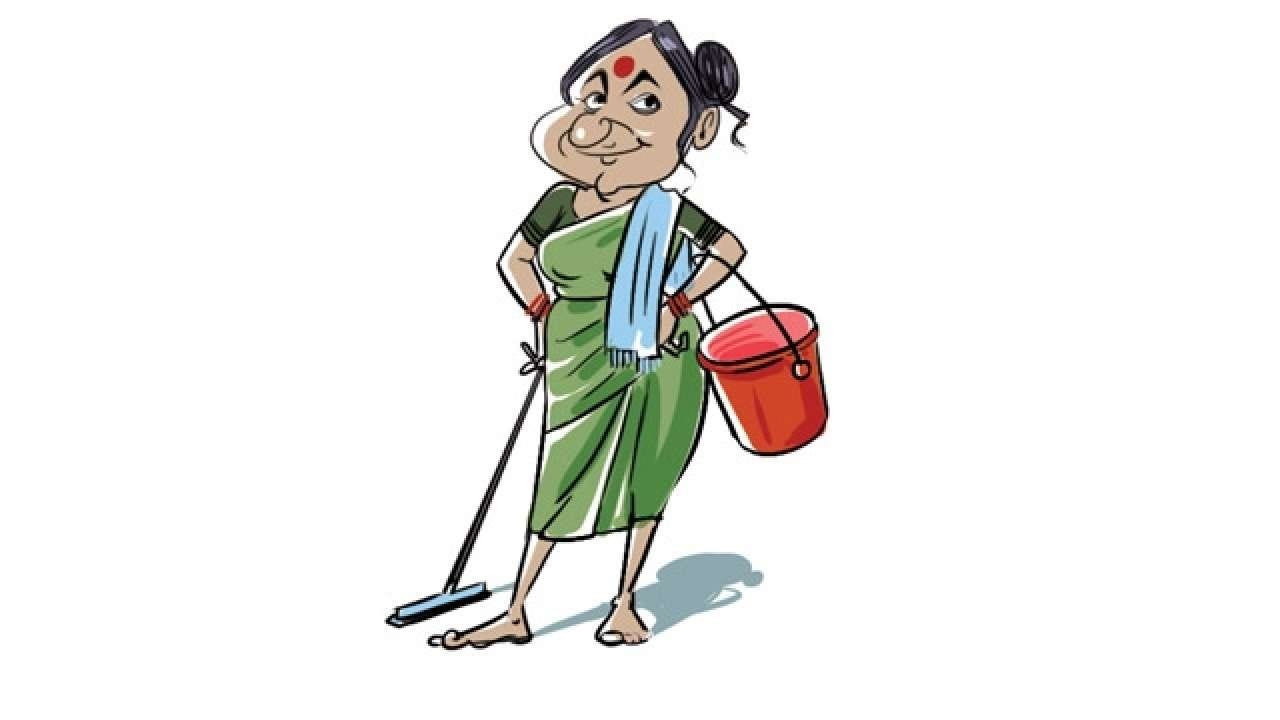Bengaluru
Many readers liked FC 246, but some of the usuals forgot to send in their comments 🙂
Tarun Kunzru: “The ability to remember the right/important things and forget the negative/unimportant things is a real gift. It has something to do with a combination of good listening skills and a sense of being objective. Those who don't carry baggage are cool and not coolies! Pras, on a lighter note, if you had hindsight, you would not have sat on your reading glasses.”
Lynn Weiss: “Sometimes, forgetting is forgiving; truly a gift that makes grudges disappear.”
Krupa Murthy: “Every Sunday, we do not forget to read and drink filter coffee!! We do not forget to wake up every morning and go to sleep every night! But in between, many things need to be done, and we fear forgetting what we ought to remember!! What a paradox!!”
💎 Decadence
Let’s begin with its plain meaning. It means perceived decay in standards, morals, dignity, religious faith, or governance. In the social context, it is excessive indulgence in pleasure or luxury. The word is derived from the Latin word ‘decadentia’, which means ‘falling away’ or ‘decline’.
The prompt for this post was the clip of an Australian lady, now in India, talking about domestic and other help. She says, “For better or for worse, labour is cheap in India, so it makes sense that everyone has their own house help.” The clip went viral and elicited many comments both for and against. One of her Indian friends told her it is just not possible to manage both housework and a job without help. “I was like, that’s what we do in the west. We do everything ourselves with full-time jobs,” but then she goes on to say she felt ‘ashamed’ about how much she enjoyed not doing household chores every day in India.
All that the lady said took me back to the time when I worked with the C-suite expats, from the West. They could not believe that with their rupee converted dollar earnings, they could not just live in a spacious home but also engage a driver, a guy to walk the dogs, a guy to wash the car, a sentry to keep off strangers, a gardener to tend to their little assemblage of plants, a housemaid, a nanny (if they had a toddler) and a live-in cook to complete the help list. Does this sound like an exaggeration to my readers? I have seen it happening, trust me.
Here’s the interesting thing. One of the reportees of this expat, also an expat, sniggered and said, “What decadence! Back home, he would fix his breakfast, walk to the station, take the train, come home from work and help the wife with the chores.” A similar sentiment was expressed by an American visiting an Indian household. After watching the over-dependency on the maid and other helpers, she thought her host was not just decadent, but also feudal. She added ‘feudal’ after she saw the man of the house walking in and the driver bringing up the briefcase and the lunch basket.
The moot question for the readers is whether having one or more helpers of a varied kind is a decadent practice? Does necessity deflect the charge of decadence? How does one determine necessity? One might hire a helper as a matter of sheer convenience. I used to drive around in Bangalore, but over the years, the traffic has picked up, and my reflexes have slowed down. I have a driver, but I do drive when he goes to his native place or is unable to come. So, having a driver is convenient for me, but not an absolute necessity. My son, who now lives in the US, was driving all the time in India when he was studying, but now finds traffic in India overwhelming and depends on the driver when he visits.
Is decadence contra-indicated if a helper is indispensable? If the husband and wife are both working, and they hire a cook and a maid, it may be an indispensable need from their perspective, but that need comes at a cost which they think they can afford. Can mere affordability in the absence of indispensability lead to decadent hiring of staff? The jury is out on this.
If one has people waiting hand and foot who are paid by borrowing from someone just to portray a rich lifestyle for external appearances, it would be a case of decadence. The decay and the decadent life of an Indian prince in the 1940s are well portrayed in the novel “Private Life of an Indian Prince” by Mulk Raj Anand. The book also deals with the abolition of the princely state system in India and the sufferings of the Indian princes.
Mindless binge-watching of TV serials is considered a form of decadence. Couch potatoes watch television serials episode after episode. They get hooked on them. I am accused of binge-watching live cricket and the replays. My wife tells me that watching a match from 7 pm to 11 pm can be considered binge-watching and I become decadent when I watch a ‘double header’ on a Sunday, i.e. two matches from 3 pm to 11 pm. I concede the binge-watching charge, but how am I decadent? Can readers support me here?
Lifestyle and consumerism both involve decadence. Imagine sitting in front of the TV with a rich slice of chocolate cake in front of you. It’s a moment of pure indulgence, where calories and responsibilities take a backseat. This sense of luxury and excess, where we allow ourselves to enjoy beyond the basic needs, is what decadence is all about. Decadence can be found in everyday moments, like savouring an expensive cup of coffee or spending a lazy afternoon in a luxurious spa. One might ask, ‘Why grudge what I can afford?’. Sure, but does affordability negate the charge of decadence?
Indulgence is at the core of decadence. Luxury, and living life beyond necessity, where extravagance and self-expression take centre stage. You may indulge in buying things you don’t need, upgrading to the newest cell phone in exchange for a perfectly working phone. Buying expensive designer bags, expensive sneakers, and high-end watches, and dining in an expensive Michelin-starred eatery are instances of self-indulgence. Nothing wrong is pampering yourself, but the element of decadence lurks. Some people feel entitled to all of this, and some feel guilty splurging when they could have put the money to good use or for a good cause. It is a choice that each individual makes. Decadence is all about wilful indulgence.
We have been witnesses to lavish marriage celebrations by the rich & famous. This is not just about what the have-nots think of such vulgar display or extravaganza. It is about how unconscionable it all seems, even to the well-heeled.
Decadence has been connected with high-society for aeons. Here are some historical instances1:
The Roman Empire’s decline is a classic example of decadence. Lavish spending on entertainment, like gladiator games and opulent feasts, marked its final years. The empire’s leaders focused more on personal luxury and indulgence than on governance, leading to its eventual fall.
Emperor Caligula’s reign in ancient Rome is infamous for its extravagant excesses. Known for his erratic behaviour, Caligula spent lavishly on luxurious banquets and bizarre spectacles. His focus on personal pleasure and power, often at the expense of the state’s well-being, exemplifies a classic case of decadence.
The Ottoman Empire’s last years were marked by a focus on luxury and personal gain among its leaders. The sultans indulged in lavish palaces and extravagant lifestyles, while the empire’s political and economic structures weakened, leading to its eventual collapse.
The grandeur of the pharaohs’ tombs in ancient Egypt showcases a form of decadence focused on the afterlife. Lavishly decorated with gold and treasures, these tombs were built to ensure the pharaohs’ comfort in the next world. This focus on eternal luxury often diverted resources from the living population.
Here’s a positive take on the notion of decadence. It is being redefined in the context of people indulging in their personal well-being. People are increasingly investing in health, wellness, and self-care without considering these as new forms of indulgence. From organic foods to meditation retreats, these choices highlight a shift towards nurturing the self in more holistic ways.
Let me end with a pun:
Which toothpaste do the rich & indulgent people use?
Deca-dent.
Dear readers, I hope you enjoyed reading this post. Please write in your comments. See you next week. Ciao!
PS: I am going to ‘God’s Own Country’ to attend a wedding. Here’s an opportunity for a guest post on 11th May.







My take.
Earlier generations our grandparents were brought up in a feudalistic society. Kingdoms and princely states, rich land owners, bonded labour and so forth. The next generation we were ruled by the British Lordship Dukes et al who had the subservient Indians serving them. So we grew up living this way of life.
In the present scenario, there are 2 aspects
1. Necessity (working couples, elders with empty nests) who need or require assistance and help.
2. Decadence. Making a statement “I HAVE ARRIVED “. & Peer pressure. Beg borrow or steal if you cannot afford it, but you want to live with the Joneses as they say.
In both cases it creates employment. As far as one maintains a balance and respects and values it’s worth.
Maybe Prasanna, by using these helps we are giving them an opportunity to earn a living too. They would otherwise be idle minds and a social menace. Again indulgence in this is very relative - what maybe indulgence for one may not be for another - with exceptions of course.